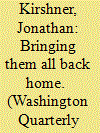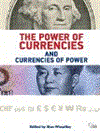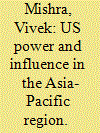| Srl | Item |
| 1 |
ID:
124847


|
|
|
|
|
| Publication |
2013.
|
| Summary/Abstract |
A generally underappreciated shift in U.S. engagement with the global macroeconomic order, accelerated by the global financial crisis, has complicated managing the dollar as a global currency and placed new, politically unfamiliar constraints on U.S. power.
|
|
|
|
|
|
|
|
|
|
|
|
|
|
|
|
| 2 |
ID:
154541


|
|
|
|
|
| Summary/Abstract |
That the anarchic system generates incentives for states to balance each other's power is conventional wisdom in international relations. As such, the contemporary unipolar system is an anomaly. Observers explain its existence in several ways, including the benevolence of US hegemony and the constraints international institutions impose on the exercise of US power. None of them, however, explain what is perhaps the most puzzling outcome of the Soviet collapse: the decision of the United States to maintain its level of military spending. To explain its choice, we extend the seminal argument Waltz advanced long ago to a dynamic setting. Using a simple model, we show that the interest of the unipole in deterring a challenge to its power can induce it to continue to invest in guns rather than to shift its resources to the production of butter. This strategy can enable the incumbent unipole to pre-empt the balancing process that has long been thought to be central to state survival under anarchy.
|
|
|
|
|
|
|
|
|
|
|
|
|
|
|
|
| 3 |
ID:
123785


|
|
|
|
|
| Publication |
2013.
|
| Summary/Abstract |
Internet freedom is rapidly becoming understood as a normative framework for how the Internet should function and be used globally. Recently declared a human right by the United Nations, it also forms a central pillar of the USA's 21st Century Statecraft foreign policy doctrine. This article argues that although there is a clear human rights agenda present in this policy, there is also a power element which is much less discussed or acknowledged in the vast literature on Internet freedom. Through an exploration of both a short history and some important lessons learned about Internet freedom, this article demonstrates how the US Department of State has adapted to the information age in such a way as to harness individual agency (reconceptualised in policy terms as 'civilian power') for the promotion of state power. Although this is by no means as stable or reliable as some more conventional mechanisms, it is an expression of power that meets with few challenges to its legitimacy.
|
|
|
|
|
|
|
|
|
|
|
|
|
|
|
|
| 4 |
ID:
126801


|
|
|
|
|
| Publication |
London, IISS, 2013.
|
| Description |
156p.Pbk
|
| Standard Number |
9781138023604
|
|
|
|
|
|
|
|
|
|
|
|
Copies: C:1/I:0,R:0,Q:0
Circulation
| Accession# | Call# | Current Location | Status | Policy | Location |
| 057556 | 332.4/WHE 057556 | Main | On Shelf | General | |
|
|
|
|
| 5 |
ID:
144559


|
|
|
|
|
| Summary/Abstract |
Recently, the nature of the presence of the US in the Asia-Pacific has undergone significant changes. At least three developments—the rise of an economically and militarily resurgent China, a renewed counter-strategic approach by the US to rebalance its engagements with its close regional allies like Japan, the Philippines, South Korea and Australia, and the US’ efforts to expand and extend strategic cooperation with India and Vietnam—show that there are new emerging differences between the US and its four major non-NATO allies in the Asia-Pacific. These developments point towards declining strategic reciprocity of these nation states with the US and vice versa as they seek relative autonomy in their engagements with Beijing along with other extra-regional powers. While this has tacitly mandated the expansion of the US alliance system from the core Asia-Pacific region westwards to include the Indo-Pacific, the Indian Ocean and a few other Southeast Asian nations, it has also depicted the insufficiency of the US’ alliance with non-NATO allies in meeting its somewhat altered regional objectives since the turn of the century.
|
|
|
|
|
|
|
|
|
|
|
|
|
|
|
|